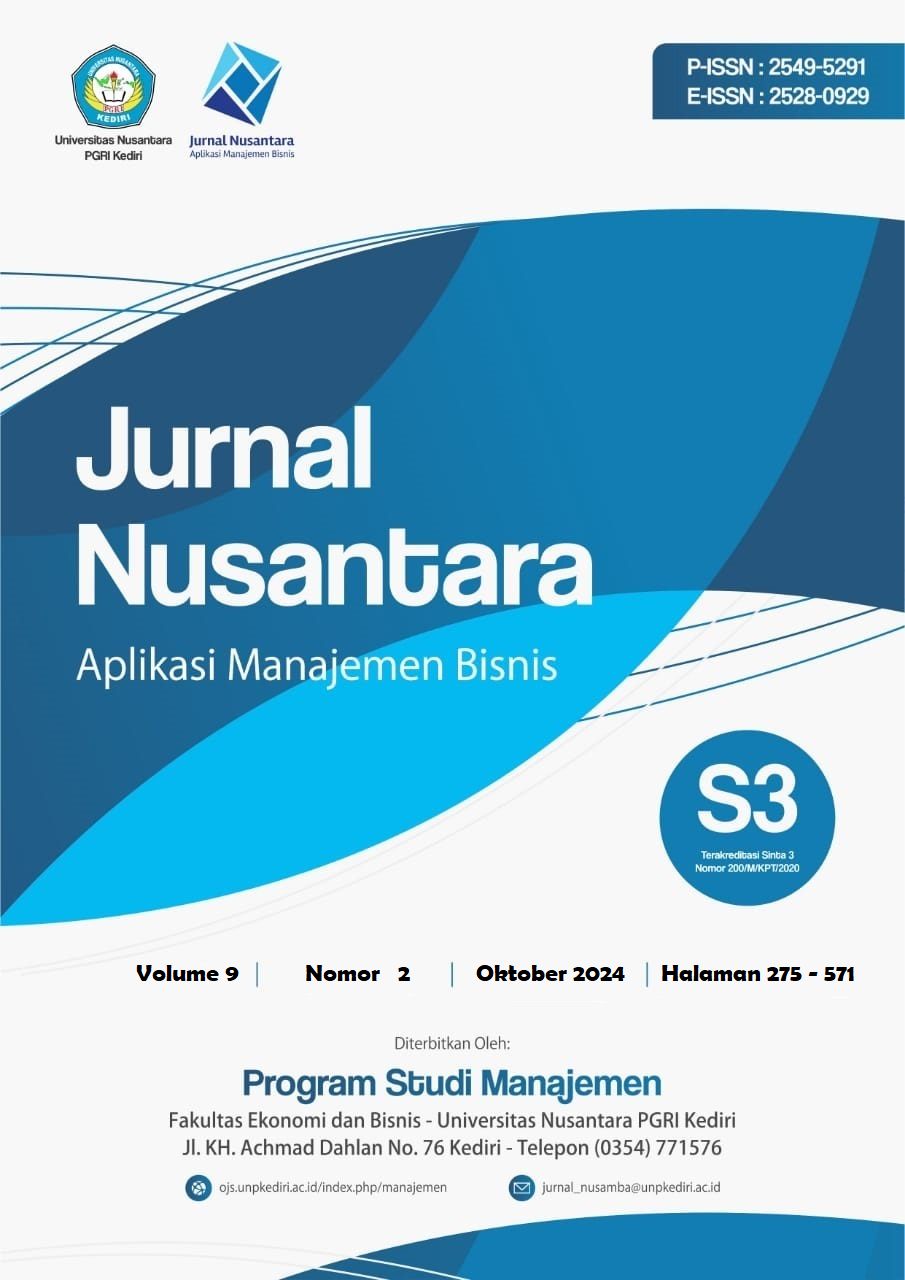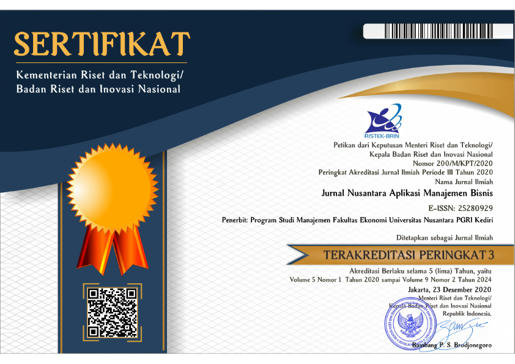Kolaborasi Content Marketing dan Event Marketing sebagai Strategi Meningkatkan Loyalitas Pelanggan Wisata Korea Fantasy
DOI:
https://doi.org/10.29407/nusamba.v9i2.19485Keywords:
Content Marketing, Event Marketing, Customer LoyaltyAbstract
Research aim: Determine the collaboration of content marketing and event marketing as a strategy to increase customer loyalty of Korea Fantasy Kediri Tourism. The research approach uses qualitative with case studies.
Approach: Data collection techniques include interviews, observations, and online and offline documentation. Data validation uses data source triangulation.
Research Finding: The results of the study: (1) Content marketing through content creation begins with conceptualizing and sharing ideas, photos and videos uploaded at any time and does not yet have a special team. Content sharing uses social media and TikTok as superior media, connecting through the government, hotels, restaurants, universities/schools, and communities and for community buildings using social media and meetings. (2) Event marketing through the enterprise by creating events that are in accordance with the event and attractive, entertainment by inviting popular artists and creating events that have value benefits, excitement through events that create happiness, pride, and satisfaction.
Originality: This research shows content and event marketing collaboration can create a more immersive customer experience. Companies can significantly increase customer engagement by combining engaging content and interactive events.
Practitioner implication: Social media is important for promoting events and content. Companies can use these platforms to invite participation, spread information, and build momentum.
Research limitation: The rapidly changing marketing environment may affect the relevance of the strategies proposed in this study. Trends or consumer preferences could make the strategy less effective over time.
Downloads
References
Kreatif KP dan EKBP dan E. Rencana Strategis Kementerian Pariwisata dan Ekonomi Kreatif 2020-2024. 2020.
Fotiadis A, Polyzos S, Huan TCTC. The good, the bad and the ugly on COVID-19 tourism recovery. Ann Tour Res 2021;87:103117. https://doi.org/10.1016/j.annals.2020.103117.
Škare M, Soriano DR, Porada-Rochoń M. Impact of COVID-19 on the travel and tourism industry. Technol Forecast Soc Change 2021;163:120469. https://doi.org/10.1016/j.techfore.2020.120469.
Statistik BP. Statistik Perkembangan Pariwisata dan Transportasi Nasional November 2020. 2020.
Kartiko ND. Tax Incentives in Responding to The Impact of The Covid-19 Pandemic on The Tourism Sector. J Pajak Dan Keuang Negara 2020;2:124–37.
Griffin J. Customer royalty: menumbuhkan dan mempertahankan kesetiaan pelanggan. Jakarta: Erlangga; 2016.
Rambat L. Manajemen Pemasaran Jasa. Jakarta: Salemba Empat; 2013.
Limandono JADD. Pengaruh Content Marketing Dan Event Marketing Terhadap Customer Engagement Dengan Sosial Media Marketing Sebagai Variabel Moderasi Di Pakuwon City. J Strateg Pemasar 2018;5:11.
Halvorson K, Rach Melissa. Content Strategy for the Web. 2020.
Elisa R, Gordini N. Content Marketing Metrics: Theoretical Aspects and Empirical Evidence. Eur Sci J 2014;10:1857–7881.
Hoyle LH. Event Marketing: How to Successfully Promote Events, Festivals, Conventions, and Expositions. Wiley; 2002.
Wiza T, Suryawardani B. Pengaruh Event Marketing Terhadap Loyalitas Konsumen Pada PT. Dealpro Indonesia Tahun 2020. EProceedings Appl Sci 2020;6:2809–17.
Puspasari ID, Sudarmiatin, Hermawan A. Strategi Penguasaan Pasar Usaha Kecil melalui Pengelolaan Laba untuk Bangkit dari Kegagalan. J Ris Dan Apl Akunt Dan Manaj 2022;6:53–62. https://doi.org/10.33795/jraam.v6i1.005.
Gunelius S. 30 Minute Social Media Marketing. McGraw Hill Professional; 2010.
Downloads
Published
Issue
Section
License
Authors who publish with this journal agree to the following terms:
- Copyright on any article is retained by the author(s).
- The author grants the journal, the right of first publication with the work simultaneously licensed under a Creative Commons Attribution License that allows others to share the work with an acknowledgment of the work’s authorship and initial publication in this journal.
- Authors are able to enter into separate, additional contractual arrangements for the non-exclusive distribution of the journal’s published version of the work (e.g., post it to an institutional repository or publish it in a book), with an acknowledgment of its initial publication in this journal.
- Authors are permitted and encouraged to post their work online (e.g., in institutional repositories or on their website) prior to and during the submission process, as it can lead to productive exchanges, as well as earlier and greater citation of published work.
- The article and any associated published material is distributed under the Creative Commons Attribution-ShareAlike 4.0 International License












